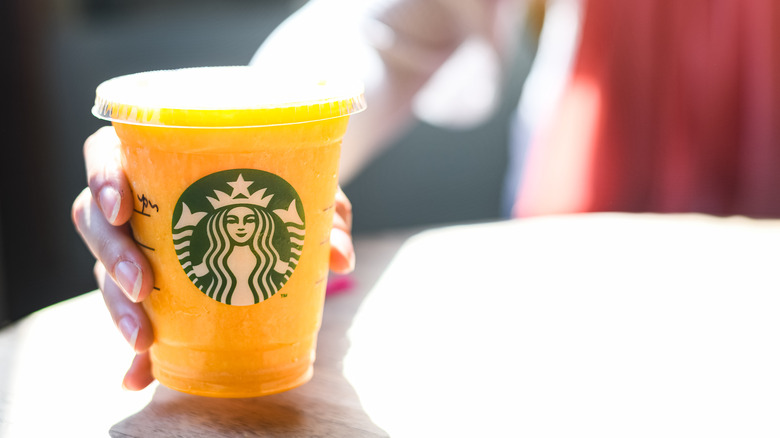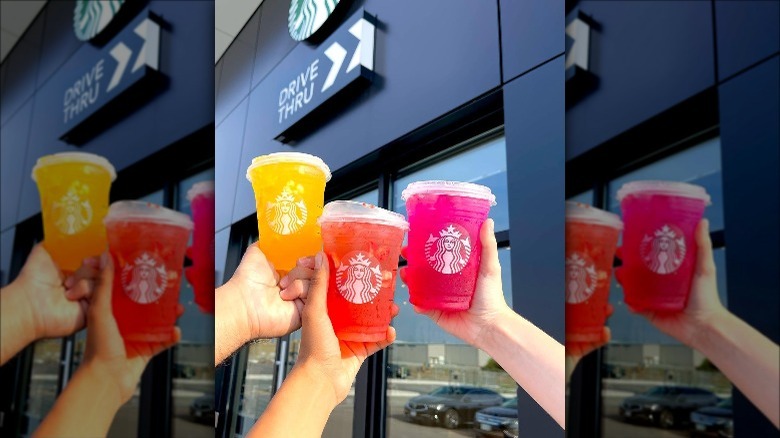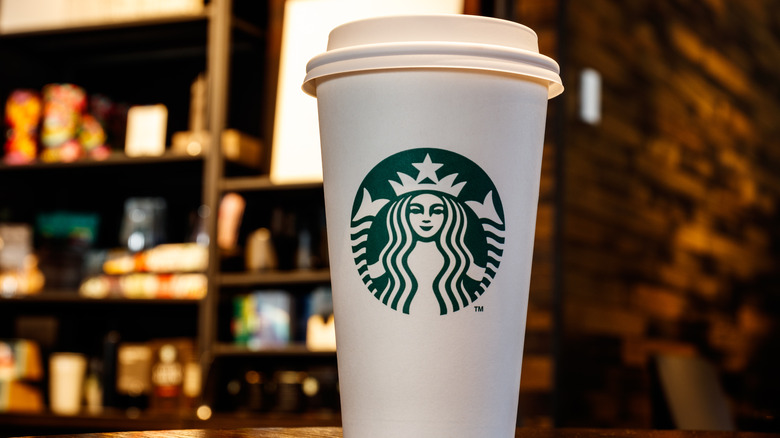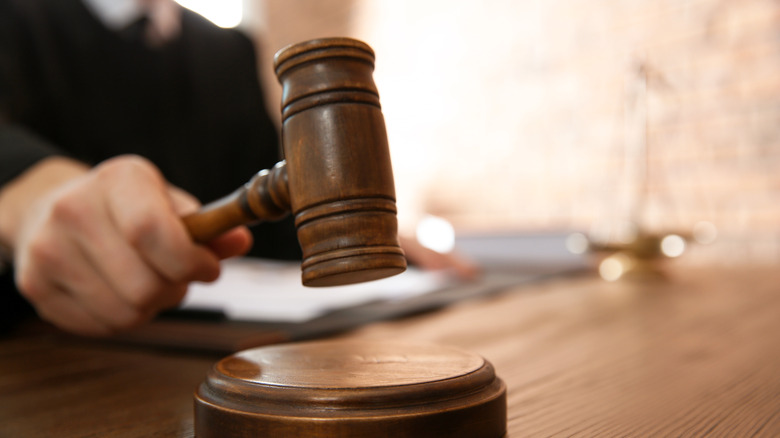The Controversial Reason Starbucks Is Being Sued Over Refreshers
Update 8/10/22: This story has been updated to include a statement from Starbucks.
Starbucks has been in the news a lot lately. The chain claims that its July announcement about the closing of stores is "just the beginning" of other major changes coming to the brand. But it's also been making headlines for employees' union efforts passing major milestones, and the company even tried to bring a case against Arizona union organizers in court (per The Arizona Republic). Now, thanks to a recent lawsuit, it looks like the chain's legal troubles are far from over.
The lawsuit is being brought against Starbucks by an angry customer in New York (via Delish). They allegedly noticed that there was more than one item on the Starbucks menu that wasn't what it seemed and managed to get a group together to file a class-action lawsuit against the brand. In their suit, the customer alleges that several of the chain's Refresher drinks don't contain the fruits that their names would imply.
For its part, a Starbucks spokesperson told Mashed, "We are aware of the lawsuit. The allegations in the complaint are inaccurate and without merit. We look forward to defending ourselves against these claims."
The lawsuit alleges the drink names are misleading
If you love Starbucks Refreshers, you might be surprised to hear that many of the drinks allegedly don't contain the fruits one might think they do, based on the beverage names. A lawsuit against the company purports that "the Mango Dragonfruit and Mango Dragonfruit Lemonade Refreshers contain no mango, the Pineapple Passionfruit and Pineapple Passionfruit Lemonade Refreshers contain no passionfruit, and the Strawberry Acai and Strawberry Acai Lemonade Refreshers contain no acai" (via Delish).
If what this suit alleges is true, what exactly is in these drinks? According to the Starbucks website, the drinks contain freeze-dried bits of fruit, such as pineapple and strawberries. The "Mango Dragonfruit Refreshers Base" used in both mango drinks lists water, sugar, and white grape juice concentrate as the primary ingredients. There's also an ingredient labeled "natural flavors" with no further detail as to where these flavorings come from. This list is almost identical to that for the pineapple Refreshers, with the exception of beta carotene to give the drinks their orangey-yellow color. Starbucks' Strawberry Acai Base also contains water, sugar, white grape juice concentrate, the vague "natural flavors," and an equally vague ingredient labeled "fruit and vegetable juice."
One positive note: For the lemonade-version Refreshers, the lemonade used in the blend does list lemon juice in the ingredients, though this one accurate listing is likely little comfort to customers expecting more transparency from their favorite coffee shop.
Starbucks has faced criticism over misleading labeling before
Sadly for the popular chain, this isn't the first time customers have felt deceived by what's in — or not in — their pricey drinks. The chain faced a scandal a few years back when customers became angry upon realizing that Starbucks' signature fall drink, the Pumpkin Spice Latte, didn't really contain pumpkin. This was first revealed in 2015 by author Vani Hari in a post on her blog FoodBabe.
It took dozens of emails from Hari before Starbucks finally shared the complete list of Pumpkin Spice Latte ingredients. She discovered several details about the contents of the drink, including artificial caramel coloring, a hefty dose of sugar, and vaguely-labeled "natural ingredients."
But the biggest surprise to Hari was the fact that the Pumpkin Spice Latte contained no real pumpkin, and instead relied on a "pumpkin spice flavored sauce." News of the lack of pumpkin and the overall unhealthiness of the Starbucks' latte went viral on social media. Starbucks bowed to the online criticism and announced that same year that its Pumpkin Spice Lattes would no longer contain caramel coloring and would be made with real pumpkin, according to USA Today.
Starbucks may be in violation of a New York State advertising law
According to the lawsuit (via Bloomberg), Starbucks is in violation of a New York state law that's designed to protect consumers from false advertising claims. According to the website for the NYC Bar Legal Referral Service, the law says that when companies promote and advertise their products, "dishonesty is not permitted. Especially about things the consumer cannot verify, like the ingredients in a product." It's seen as a form of misrepresentation that may mislead customers and includes intentionally omitting details that could affect the customer's purchasing decision.
Online, not everyone seemed sympathetic to the suit. "Wait until they find out that Girl Scout Cookies contain no Girl Scouts and baby back ribs are actually pork," joked one Twitter user. But others seemed to understand what the big deal is. "It cost me 6 bucks for a small strawberry/acai. AND THERE WAS NO ACAI IN IT?" asked another surprised commenter. Another user chimed in to lament, "$10 for water with grit in it."
Only time — and the law — will tell just how damaging these allegedly misleading drink names will be to the Starbucks brand..



